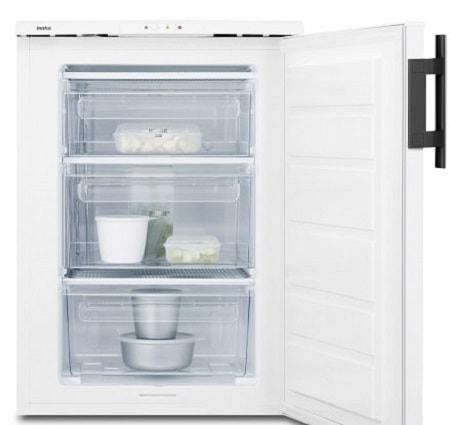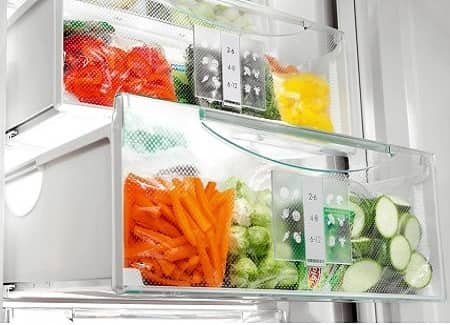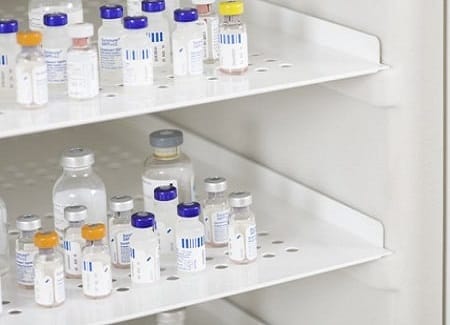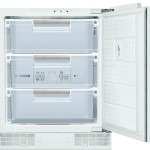European standards require several types of freezers in the refrigerator. This is important for safe storage of food and also in terms of energy conservation. RF standards imply a temperature in the chamber from -18 to -24 degrees, the European approach is more correct.
Food storage
Different temperature conditions can affect the quality and shelf life of different products in different ways. Certain foods may remain edible at different temperatures; for others, longevity is directly related to how the temperature in the freezer is set during storage. An example of the second type of product is margarine, which retains its properties from 10 to 90 days, depending on the storage temperature.
It is not difficult to calculate that for certain products, lower temperatures increase the shelf life several times. When purchasing large consignments of individual goods, it is advisable to organize the storage temperature as low as possible; this requires large refrigerating chambers with an appropriate temperature. According to European standards, the temperature in the freezer is divided into the following classes:
- about 0 degrees (0 stars);
- minus 6 (1 star);
- minus 12 (2 stars);
- minus 18 (3 stars);
- below minus 18 (4 stars).

The availability of different chambers allows you to choose the refrigerator that best suits your needs. You focus on the classes of freezers, which helps you choose the best model for storing food.
See also:
- 7 best Bosch refrigerators according to customer reviews
- 8 Best Samsung Refrigerators According to Buyers
- 9 Best Inexpensive Refrigerators According to Buyers
- 10 best LG refrigerators according to customer reviews
Freezer meat
The overwhelming majority of the products stored in the refrigerator are meat products. At temperatures below 14 degrees, the shelf life of meat products can reach up to six months. Meat dishes in a 4-star freezer can be stored for up to three months. At the same time, storage of frozen meat at a temperature of about 8 degrees below zero is reduced to one and a half weeks.

The correct temperature in the refrigerator compartment will help to achieve the optimal shelf life. If you plan to store meat products for a long time, the temperature should be below minus 14 degrees, and the class of the freezer should not be less than 3 stars. If you plan to eat meat in a short time, a refrigerator with a temperature of about 8 degrees below zero is quite suitable. It should be borne in mind that maintaining the cold requires high energy costs, so it is necessary to calculate the economic feasibility.
![]() See also - The nuances of choosing and installing a built-in refrigerator
See also - The nuances of choosing and installing a built-in refrigerator
Chicken eggs in the refrigerator
The lower the temperature, the longer the shelf life of the food. This rule is known to many, but in some cases it does not work, this is the case with the storage of chicken eggs.The optimal storage temperature is between 0 and minus 2 degrees, with this mode eggs can be stored for up to three months.
It is believed that an egg can be stored for a long time even at room temperature, but this is not always true. Chicken eggs often go out, leading to unpleasant odors. At low temperatures, such a product can simply burst, it is the temperature of minus 2 degrees that is optimal. For storing this type of food, chambers of class 0 stars are suitable.
Storage of fish products
Fish are more finicky for the preservation of their taste. The optimum temperature is in a 3-star freezer. Different types of fish differ in shelf life, freshwater species can be stored for up to six months, and marine ones for no more than four months. If the temperature in the freezer is about 10 degrees, the longevity of fish products is cut in half. The shelf life of finished fish products is reduced by half.
Freezer medication
Certain types of drugs must be stored at low temperatures; ordinary freezers do not always meet all the requirements. Specialized freezers have precise temperature control, noise and light alarms, and special operating modes. Such refrigerators do not fall under the generally accepted classification, since there are many nuances of their work.

The cost of refrigerators with such chambers is much higher, but what other chamber is capable of creating temperatures below 30 degrees. It is worth taking care of the quality of storage of medicines as much as possible; for areas with a hot climate, refrigerators with effective thermal insulation are better suited. Some medicines can be stored in conventional freezers, so buying a refrigerator with a special chamber should be justified, not in all cases its use is justified.
![]() See also - DIY freezer installation tips
See also - DIY freezer installation tips

